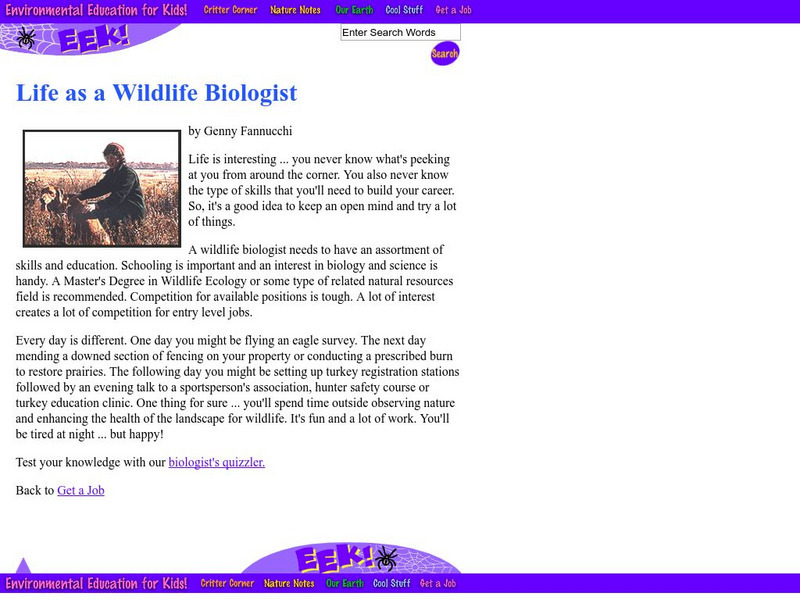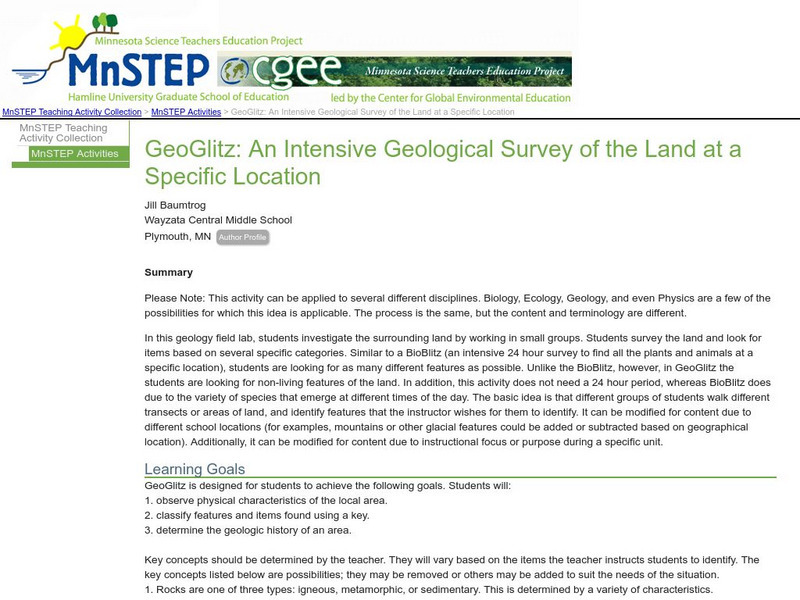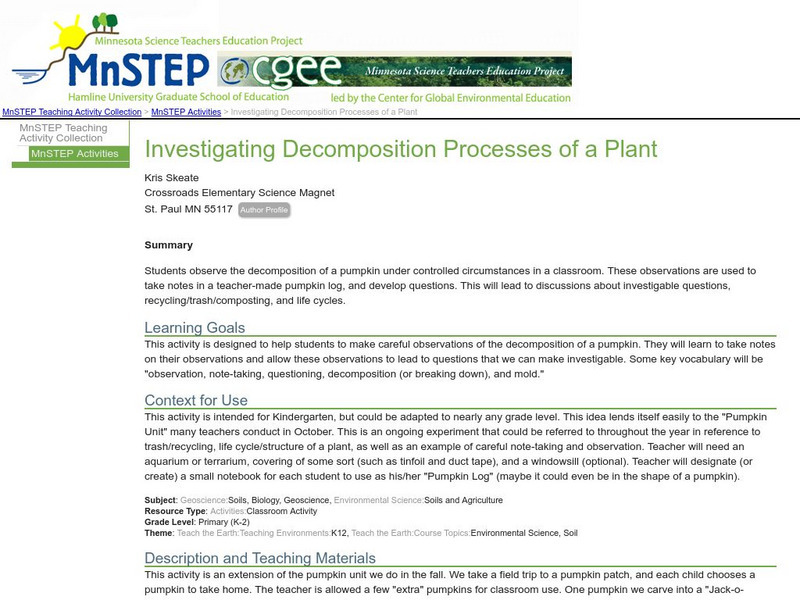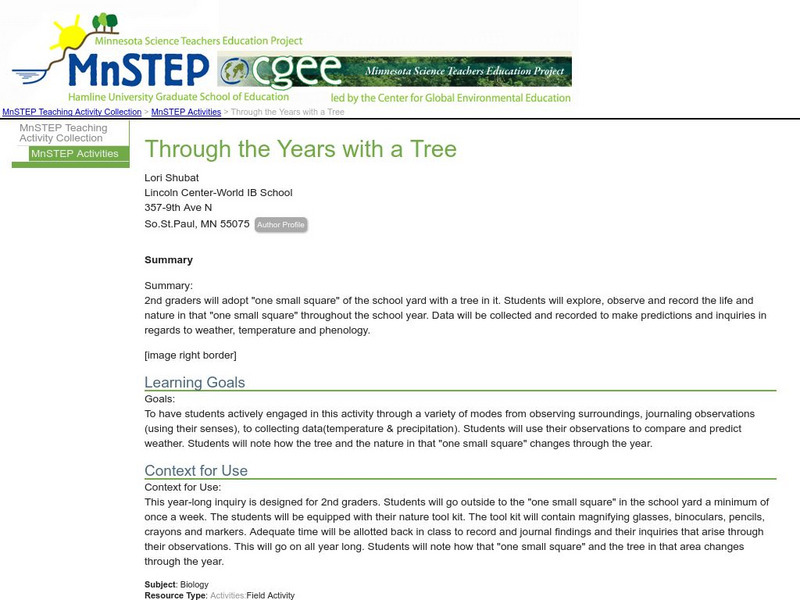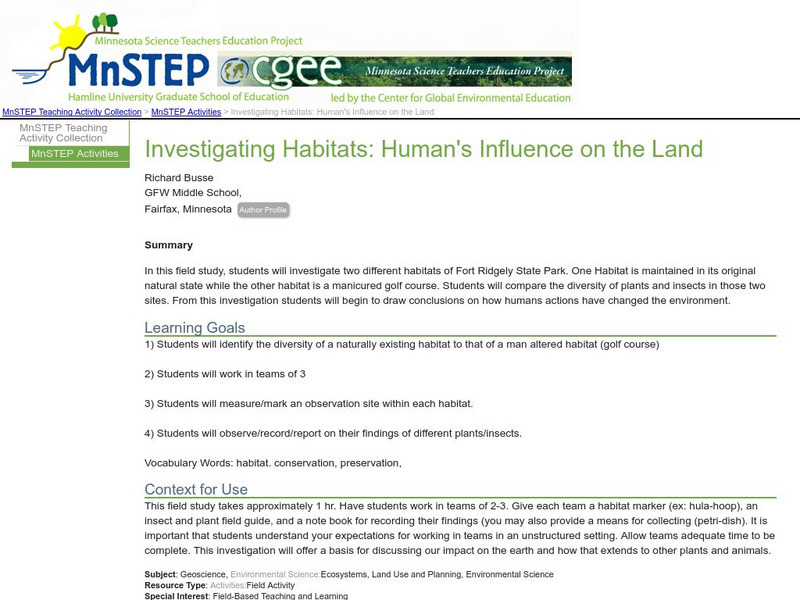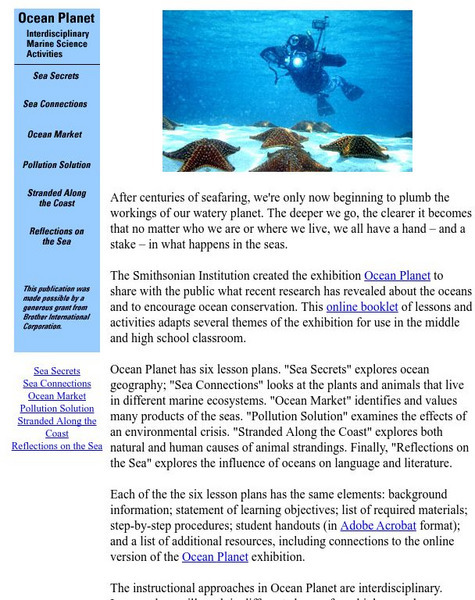Morning Earth
Morning Earth: Thirty One Learning Activities Toward Ecological Literacy
This informative lesson plan site explains how to use art in the classroom to teach science. Thirty-one plans are provided on various ecological topics. As the art is made the students are implicitly learning the ecology principle.
American Museum of Natural History
American Museum of Natural History: O Logy: What's the Big Idea? Biodiversity
Find information about diversity among genes, species, and ecosystems that helps answer questions about the importance of biodiversity and how we can save species from extinction.
US Department of Labor
Bureau of Labor Statistics: Biological and Medical Scientists
Description of the career of biological scientist, including ecologist, with links to education, outlook, wages, and job outlook information.
University of California
Ucmp: Nematoda Roundworms
General info from the University of California on the the physical characteristics and population ecology of roundworms.
Scholastic
Scholastic:magic School Bus Themes Index
Magic School Bus cross referenced by themes to provide quick access to many activities and references.
NC State University
Nc State University: Natural Resources Research Information
This comprehensive research guide is designed for students or those interested in the ecology, agriculture, or forestry of the world.
Texas Instruments
Texas Instruments: Jason: Sediment Deposition Let the River Run
Disappearing Wetlands: Examine changes in sediment deposition at locations along the Mississippi River using data collected at two stations by the U.S. Geological Survey (USGS).
Texas Instruments
Texas Instruments: Ecology Vocabulary
This StudyCards stack enables students to review the vocabulary used in studying ecology.
Environmental Education for Kids
Eek!: Life as a Wildlife Biologist
This site describes the skills needed for a career in Wildlife Biology. Includes link to a quiz that tests the student's knowledge of Wildlife issues.
Environmental Education for Kids
Eek!: Evergreens
Site chronicles Wisconsin's Evergreen and Conifer trees. There are descriptions of the various tree types. Additionally, site details the uses of these trees in nature. Ideal for grades 4-8.
US Environmental Protection Agency
Epa: A Kids Adventure Story
This cartoon describes what the EPA's Superfund is and how water can become polluted. A lab experiment with Q&A is included.
Next.cc
Next: Birds
Multiple activities help students gain a better understanding of birds and their role in the food web. Click on the links provides for further exploration.
Science Education Resource Center at Carleton College
Serc: Interdependence of Life: How an Ecosystem Responds to Change
In this biology field investigation, students will investigate the site of an environmental disturbance, identify plant and animal life within that specific area, and compare it to an adjoining forested area. Students will map both areas...
Science Education Resource Center at Carleton College
Serc: Ecosystem Study
Studets investigate the health of an ecosystem and the effects of water, sunlight, nutrients or pollutants. They determine the change in the environment through observation, journaling, and measuring growth of the plants and living...
Science Education Resource Center at Carleton College
Serc: Geo Glitz: Intensive Geological Survey of the Land at a Specific Location
In this geology field lab, students investigate the surrounding land by walking different transects of the ecosystem, looking for and identifying as many different living and nonliving ecosystem features as possible
Science Education Resource Center at Carleton College
Serc: Habitat Loss Game
In this role playing game, students become members of a forest ecosystem to illustrate the challenges facing endangered species, the environment, and economic interests.
Science Education Resource Center at Carleton College
Serc: Investigating Decomposition Processes of a Plant
Students observe the decomposition of a pumpkin under controlled circumstances in a classroom. This can be used to lead discussions on recycling, trash, composting, or life cycles.
Science Education Resource Center at Carleton College
Serc: Through the Years With a Tree
Young scholars explore, observe, and record the life and nature in their adopted "one small square" throughout the school year. As they collect data, they make predictions and inquiries in regards to weather, temperature, and phenology.
Science Education Resource Center at Carleton College
Serc: Investigating Habitats: Human's Influence on the Land
Students will investigate two different habitats; one habitat is maintained in its original natural state while the other habitat is a manicured golf course. Students will identify and compare the diversity of plants and insects in those...
Science Education Resource Center at Carleton College
Serc: Courtyard Observations One Small Step
Learners observe a one square foot area to make detailed observations of plants, animals, and insects outdoors in the school courtyard.
Science Education Resource Center at Carleton College
Serc: Using Plant Surveys to Study Biodiversity
An extended field investigation intended as launch into several concepts in environmental science including biodiversity, human impacts on natural systems, and energy transfer in ecosystems.
Science Education Resource Center at Carleton College
Serc: Ecology/geography Classification
This outdoor lesson helps students better understand ecological and geographical classifications by teaching it simultaneously in science and geography class. Presenting the two classifications together will help reinforce the idea of...
Smithsonian Institution
Smithsonian Education: Art to Zoo What Can You Do With a Portrait?
This is the very first published issue of Art to Zoo. Unlike later issues, it features three separate topics instead of one larger theme. In this issue you can find information and resources for teaching westward expansion and its impact...
Smithsonian Institution
Smithsonian Education: Ocean Planet
A series of lesson plans designed to be used with the Smithsonian Ocean Planet exhibit (available online). Lesson topics include marine ecosystems, pollution of ocean water, animal strandings, and literature.










